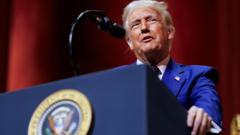An analysis of the Trump-Netanyahu meeting reveals a shift in U.S.-Israeli relations, with implications for peace efforts in the Middle East.
Trump and Netanyahu Forge Tight Alliance Amid Gaza Tensions

Trump and Netanyahu Forge Tight Alliance Amid Gaza Tensions
President Trump's recent engagement with Israeli Prime Minister Netanyahu signals a solidified partnership focused on regional priorities.
As President Trump welcomed Israeli Prime Minister Benjamin Netanyahu to the White House, the atmosphere was notably different compared to prior U.S.-Israeli engagements under the Biden administration. Netanyahu, visibly pleased, secured multiple key interests during his visit to Washington, signaling a significant shift in dynamics between the two countries.
Trump’s forthcoming approach diverged sharply from Biden’s more measured stance. The former president expressed no intention of urging Netanyahu to hesitate in military actions against Hamas, suggesting full support for Israel's ongoing operations—even amidst a temporary cease-fire. This marked the first time since Trump's re-election that he invited a foreign leader into the Oval Office, underscoring the growing camaraderie.
"I will continue to exert maximum pressure on Iran," Trump asserted, echoing previous U.S. policies while in office. This aligns with Netanyahu's long-range goal of stymieing Iranian nuclear ambitions. Furthermore, Trump reaffirmed his commitment to advancing normalization talks between Israel and Saudi Arabia, a move that could reshape Middle Eastern geopolitics.
Absent from discussions was any mention of a Palestinian state, which has historically been a point of contention in U.S.-Israeli dialogues. Instead, Trump rescinded sanctions against West Bank settlers imposed during the Biden administration, further solidifying Netanyahu's agenda.
The meeting signified more than just a political partnership; it showcased a unified stance on critical issues affecting Israel's security and international positioning. Aaron David Miller, a former peace negotiator, remarked on the implications of this closeness, noting the absence of “daylight” between the U.S. and Israel compared to previous weeks under a different leadership approach.
In summary, Trump's recent overtures to Netanyahu highlight both leaders’ commitment to strengthening their positions against common adversaries in the region while sidestepping complex negotiations regarding Palestinian interests. The potential repercussions of this alliance could alter the landscape of Middle Eastern politics for the foreseeable future.
Trump’s forthcoming approach diverged sharply from Biden’s more measured stance. The former president expressed no intention of urging Netanyahu to hesitate in military actions against Hamas, suggesting full support for Israel's ongoing operations—even amidst a temporary cease-fire. This marked the first time since Trump's re-election that he invited a foreign leader into the Oval Office, underscoring the growing camaraderie.
"I will continue to exert maximum pressure on Iran," Trump asserted, echoing previous U.S. policies while in office. This aligns with Netanyahu's long-range goal of stymieing Iranian nuclear ambitions. Furthermore, Trump reaffirmed his commitment to advancing normalization talks between Israel and Saudi Arabia, a move that could reshape Middle Eastern geopolitics.
Absent from discussions was any mention of a Palestinian state, which has historically been a point of contention in U.S.-Israeli dialogues. Instead, Trump rescinded sanctions against West Bank settlers imposed during the Biden administration, further solidifying Netanyahu's agenda.
The meeting signified more than just a political partnership; it showcased a unified stance on critical issues affecting Israel's security and international positioning. Aaron David Miller, a former peace negotiator, remarked on the implications of this closeness, noting the absence of “daylight” between the U.S. and Israel compared to previous weeks under a different leadership approach.
In summary, Trump's recent overtures to Netanyahu highlight both leaders’ commitment to strengthening their positions against common adversaries in the region while sidestepping complex negotiations regarding Palestinian interests. The potential repercussions of this alliance could alter the landscape of Middle Eastern politics for the foreseeable future.






















